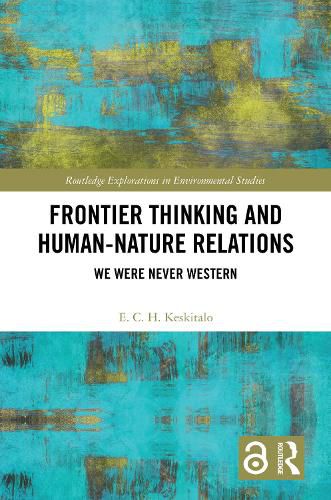Readings Newsletter
Become a Readings Member to make your shopping experience even easier.
Sign in or sign up for free!
You’re not far away from qualifying for FREE standard shipping within Australia
You’ve qualified for FREE standard shipping within Australia
The cart is loading…






Combining historical, social and regulative analysis, this book builds a compelling critique of 'frontier thinking' as it continues to form our assumptions about social and environmental organisation - in ways that impact not least the present environmental crisis.
This book systematically identifies the ways in which images of nature and society are formed by the historically developed frontier-oriented narratives which have underpinned much Anglo-American and Anglocentric thought. The book confronts these conceptions at large, showing that they never held empirically, and contrasts them with the situation in northern Europe, where diverging assumptions are integral to this day. Through this juxtaposition, this book illustrates not only the pervasiveness of structures of understanding in steering policy but also the varying traditions regarding how understandings of the environment can be formed.
This study highlights how historical thought patterns, formed for very different reasons than exist today, continue to shape our assumptions about nature, the relation between urban and rural areas and our understanding of ourselves in relation to the environment. This book will be of wide interest to a range of academics and students in the fields of geography, anthropology, environmental studies, sociology, political science and development studies, amongst others.
The Open Access version of this book, available at http://www.taylorfrancis.com, has been made available under a Creative Commons Attribution-Non Commercial-No Derivatives (CC-BY-NC-ND) 4.0 license.
$9.00 standard shipping within Australia
FREE standard shipping within Australia for orders over $100.00
Express & International shipping calculated at checkout
Combining historical, social and regulative analysis, this book builds a compelling critique of 'frontier thinking' as it continues to form our assumptions about social and environmental organisation - in ways that impact not least the present environmental crisis.
This book systematically identifies the ways in which images of nature and society are formed by the historically developed frontier-oriented narratives which have underpinned much Anglo-American and Anglocentric thought. The book confronts these conceptions at large, showing that they never held empirically, and contrasts them with the situation in northern Europe, where diverging assumptions are integral to this day. Through this juxtaposition, this book illustrates not only the pervasiveness of structures of understanding in steering policy but also the varying traditions regarding how understandings of the environment can be formed.
This study highlights how historical thought patterns, formed for very different reasons than exist today, continue to shape our assumptions about nature, the relation between urban and rural areas and our understanding of ourselves in relation to the environment. This book will be of wide interest to a range of academics and students in the fields of geography, anthropology, environmental studies, sociology, political science and development studies, amongst others.
The Open Access version of this book, available at http://www.taylorfrancis.com, has been made available under a Creative Commons Attribution-Non Commercial-No Derivatives (CC-BY-NC-ND) 4.0 license.